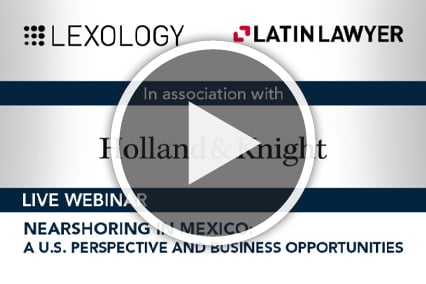Supply Chain
- Holland & Knight's multidisciplinary Supply Chain Team assists clients in making their supply chains more efficient, resilient and secure.
- Our attorneys assist clients in navigating a changing landscape of international tariffs and duties and global conflict concerns, negotiate multimodal transportation and warehousing contracts, assist in requesting government funds while advising on governmental requirements for domestic preference sourcing and other funding requirements (e.g., Buy America/Buy American), and help companies meet environmental, social and governance (ESG) goals.
- With deep knowledge of the multiple aspects that impact supply chain strategy – and a thorough understanding of how each part fits into the broader picture – our lawyers are positioned to assist clients from concept through execution of their supply chain strategies.

Overview
Successful supply chain management involves many aspects: Procurement, transportation and international trade are core elements, but issues such as real estate, land use, construction, government relations, regulatory compliance, finance and dispute resolution are often just as critical. Holland & Knight's Supply Chain Team draws on its deep experience in these areas and more to advise clients on each legal aspect impacting the supply chain.
Our lawyers help clients limit risk and capitalize on opportunities with the legal and policy aspects of supply chain management – from the beginning to the end of products' routes to or from the U.S. Our extensive knowledge about each step of the journey enables clients to develop holistic supply chain strategies.
We apply our experience, knowledge and dedicated client service to assist with transportation operations, regulatory scrutiny, international trade obligations and government relations regarding funding and other programs
Transportation, Infrastructure and Regulation
Holland & Knight's attorneys have vast experience in facilitating the efficient, resilient and secure transportation of goods, as well as developing the facilities and infrastructure for that transportation.
We have helped clients manage the following issues:
- negotiating warehousing contracts and multimodal domestic and international transportation contracts between shippers, carriers, intermediaries and third-party logistics companies (3PLs) involving every mode of transportation
- handling the real estate, land use and construction needs for new terminals, plants, warehouses and other facilities
- the sale, lease and purchase of transportation-related assets
- the use of technology in transportation, including blockchain, transportation management systems (TMS), autonomous vehicles, and advanced freight and capacity matching
Our attorneys also counsel clients in managing compliance with various government agencies, regulations and policies related to supply chains. These include:
- actions before the Federal Maritime Commission (FMC) in regard to potential violations of the Shipping Act of 1984 and the Ocean Shipping Reform Act of 2022 (OSRA), particularly in regard to demurrage and detention charges
- compliance with governmental requirements for sourcing and utilizing government funds (e.g., Buy America/Buy American and Build America, Buy America Act)
- helping to develop, organize and execute environmental, social and governance (ESG) strategies and reduce carbon footprints
- utilizing the U.S.-Mexico-Canada Agreement (USMCA) and nearshoring in Mexico, with our attorneys based in Mexico helping clients understand the complex and constantly evolving laws and regulations in regard to trade with China
- permitting, environmental and land use issues
When needed, our Supply Chain Team guides clients through disputes related to all of the aforementioned issues, with support from Holland & Knight's substantial roster of litigators experienced with supply chain matters.
International Trade
Our experienced international trade attorneys advise clients on a wide range of issues implicated in the supply chain, including:
- procuring goods and materials in a manner that minimizes customs duties and the risk of U.S. Customs and Border Protection (CBP) enforcement
- evaluating tariff compliance related to the source of products and their component parts
- import matters before CBP, including seizures, classification, valuation, country of origin and preferential duty treatment under the Generalized System of Preferences (GSP) and free trade agreements (FTAs), including the USMCA
- actions at the U.S. Court of International Trade (CIT) involving import matters and at the FMC for shippers, intermediaries and ocean carrier disputes
- U.S. trade embargoes and economic sanctions administered by the U.S. Department of the Treasury's Office of Foreign Assets Control (OFAC) and the U.S. Department of State, particularly with respect to Cuba, Iran, Russia, Ukraine and Syria
- antidumping and countervailing duties (AD/CVD) laws administered by the U.S. Department of Commerce and the U.S. International Trade Commission (USITC), including steel, solar, agriculture, chemical, furniture and construction materials industries
- U.S. export control laws, such as the International Traffic in Arms Regulations (ITAR) and the Export Administration Regulations (EAR)
- trade remedy laws, including Section 201 (safeguard investigations), Section 232 (national security investigations) and Section 301 (technology transfer/intellectual property investigations)
- matters before the Committee on Foreign Investment in the United States (CFIUS)
- facility security clearance (FCL) issues before the Defense Counterintelligence and Security Agency, the U.S. Department of Energy and the intelligence community, with a particular focus on Foreign Ownership, Control or Influence (FOCI) mitigation measures
- anti-corruption issues under the Foreign Corrupt Practices Act (FCPA) and the U.K. Bribery Act
Government Relations
Holland & Knight's Supply Chain Team advises clients on navigating Congress and the executive branch to seek funding for major projects, as well as advocates at all levels of government to support projects that impact local communities.
Our attorneys and advisors develop and implement advocacy strategies for transportation and infrastructure industry clients on a wide range of issues, including all modes of transportation, as well as emerging transportation technology.
Led by a former staff director of a key House Transportation and Infrastructure subcommittee, our government relations lawyers and professionals have experience assisting clients with:
- developing support for infrastructure developments, especially with respect to getting prospectuses approved by the Office of Management and Budget (OMB) and appropriate House and Senate committees
- supply chain integrity
- domestic preferences, such as the Buy American Act (BAA), Trade Agreements Act (TAA) and Buy America requirements
- state funding and grants for new factories
- warehousing
- technology waivers
- CHIPS and Science Act opportunities








